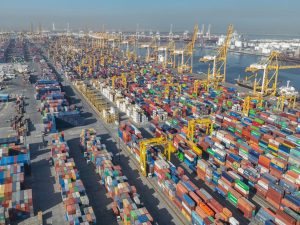The Express Industry Council of India (EICI) and The Bureau of Research on Industry and Economic Fundamentals (BRIEF), jointly launched the White Paper, titled ‘The Future of Express Cargo Clearance in India – ECCS in the New Customs Integrated System’, underlining the need to ensure the smooth integration of processes and preserve the strengths of the existing Express Cargo Clearance System (ECCS) as it is proposed to be integrated into the forthcoming Customs Integrated System (CIS). Vijay Kumar, Chief Executive Officer, EICI said, “Express cargo industry is a vital part to the logistics ecosystem, powering e-commerce and supporting India’s ease-of-doing-business and global trade integration goals. With the upcoming CIS poised to elevate India’s standing in global logistics and trade facilitation, this White Paper marks an important step in our continued engagement with policymakers. It outlines the express industry’s unique clearance requirements and calls for a seamless integration of ECCS into the CIS. We had a successful collaboration with CBIC in developing the ECCS, and this White Paper sets the course for the next vital phase of partnership—aligned with the government’s forward-looking approach to policy-making involving stakeholders. As India charts its course toward becoming a $30 trillion economy by 2047 under the Viksit Bharat mission, the express cargo industry will play a pivotal role in driving trade and fuelling MSME growth.” The White Paper aims to apprise the regulatory authorities, especially the Central Board of Indirect Taxes and Customs (CBIC), about the critical features of the currently operational ECCS and the express industry’s expectations from the new CIS. It was formally submitted to the CBIC at a consultation held in New Delhi, which was also attended by Yogendra Garg, Member (IT …
Read More »‘Rerouting due to Pak airspace closure hiked freight costs’
Arun Kumar, President, AMTOI reacted on the ongoing India- Pak situation affecting global cargo trade, he said, “The rerouting due to the closure of Pakistani airspace has undoubtedly increased operating costs for Indian carriers such as Air India, IndiGo, and SpiceJet, potentially affecting their freight rates. However, India’s air cargo carriers have consistently demonstrated adaptability under pressure. While this puts them at a temporary cost disadvantage vis-à-vis some foreign carriers, the Indian logistics sector is quick to recalibrate. Moreover, in the event of a wider regional conflict, the impact will be universal across carriers. We’ve seen similar resilience in ocean freight, where Indian trade continues to thrive despite global disruptions like the Red Sea crisis, which forced ships to reroute via the Cape of Good Hope. The Indian logistics industry has consistently turned adversity into opportunity—and will do so again.” He added, “Any disruption in air traffic, including airport closures, does pose a challenge to air cargo operations and leads to an immediate spike in air freight rates—especially with the added burden of increased Security Surcharges in times of geopolitical tension. However, India’s logistics ecosystem has evolved significantly. Today, the country boasts a robust and agile multimodal infrastructure, with efficient road and rail connectivity acting as reliable alternatives. While international air cargo may feel the heat, domestic cargo movement will continue with minimal disruption. The system has proven its resilience in the past and is well-equipped to adapt swiftly in such scenarios.”
Read More »DHL Express expands warehousing facility in Agra.
DHL Express has announced the successful expansion and relocation of its service center in Agra. The new facility, encompassing 3,900 square feet, is strategically situated and expected to enhance operational efficiency while upholding DHL service quality in Agra’s dynamic export market. R.S. Subramanian, SVP South Asia, DHL Express, said, “Agra has always been integral to India’s export story, and our enhanced facility reflects our decade-long commitment to this vital market. While strengthening our ability to serve customers with greater speed, efficiency, and reliability – the new service center allows linehaul departures to leave up to 30 minutes earlier for onward air connections from the Delhi gateway. This helps us maintain DHL’s impressive 98.1% transit time service commitment from this service center, allowing us to maintain our commitment to service quality while optimizing operational costs, delivering lasting value for our customers.” “This facility demonstrates our focus on strategic improvement within our network,” said Peter Bardens, Senior Vice President – Network Operations, Asia Pacific, DHL Express. “The new Agra service center provides immediate efficiency improvements and can handle significant year-over-year volume growth through 2033, ensuring long-term service stability for this market.” The facility includes dedicated parking spaces for pickup and delivery (PUD) vehicles, a separate Non-Conveyable Goods (NCY) area, and increased processing space. This configuration ensures better on-route productivity while helping Agra’s exporters maintain their competitive advantage in global markets through market-leading transit times. Additionally, in 2025, through DHL Express India’s partnership with the Directorate General of Foreign Trade (DGFT), Ministry of Commerce and Industry, Government of India, DHL will begin its outreach to facilitate capacity-building sessions, trainings, and workshops for the MSMEs of Agra. This cross-border e-commerce exports promotion plan will …
Read More »‘India-Pak tensions affecting trade, economic growth, fueling costs’
Reacting on the ongoing India-Pak tensions affecting global cargo trade and airline operations, Dinesh Krishnan, Southern Chairman, ACAAI Region said, “The International air freight market is nervous due to uncertainty of how the issue will pan out in the short and medium term. The trade is just recovering from the USA tariff induced supply chain shock and now this issue is adding to the uncertainties. Uncertainty in the markets on supplies and timely export of final products are a major hindrance to Exim trade. Due to interlinking of supply chain and transport corridor, blockade to sea, air and land routes creates vulnerability in the logistics pipeline distorting production and shipments dispatch schedules across the Exim trade. Longer flight time translated to higher air freight costs for the trade. This is a wasteful expense of fuel burning in the air to take alternative routes and a drag on economic development of both the countries. Many of the inputs used for Indian export & domestic consumption are sourced from across the border with Pakistan, coming from west Asia, Afghanistan & beyond, these goods are routing is now impacted. EXIM Sectors in Agriculture produces, Chemical, Pharma, Equipment’s and general cargoes are impacted due to the current embargo on trade between the 2 countries. Forwarders do not have a short-term solution, we are all waiting to see how this will go and then formalise medium and long terms alternative routing and logistics to help our EXIM customers navigate this crisis.”
Read More »Pharma.Aero, TIACA unite to boost healthcare & agri cargo
Pharma.Aero and TIACA have partnered on the Food and Farm for Health project to underscore the economic value and the dual role of air cargo in healthcare access and economic development in low and middle-income countries. Strategically developed in collaboration with CCA (The Cool Chain Association) and HLA (The Humanitarian Logistics Association, the project seeks to optimize air cargo’s potential to deliver life-saving medicines while simultaneously supporting local agricultural economies. Frank Van Gelder, Secretary General of Pharma.Aero said, “The Food and Farm for Health Project is about leveraging air cargo to address two critical needs in low- and middle-income countries: healthcare access and economic empowerment. We, at Pharma.Aero, recognized a critical gap and initiated this project to use air cargo as a dual-purpose tool: flying in life-saving pharmaceuticals and medical supplies while flying out perishable agricultural products—like fruits, vegetables, and flowers—from local farmers to Western markets. By utilising available cargo space on return flights, we create a more cost-effective, efficient trade route. This approach not only ensures faster access to essential medicines and vaccines, but also opens new market opportunities for farmers, boosting local economies and providing better access to international markets”, said Van Gelder. “Air cargo is more than a mode of transport — it’s a critical lifeline for economies and communities across the globe”commented Steven Polmans, Chair of TIACA. “The completion of our Global Market Evolution Analysis marks a major milestone in understanding how perishable goods and pharmaceuticals move, especially in regions where access means everything. From Kenya’s flower exports supporting millions of jobs to India’s seafood sector driving billions in trade, our work confirms that airfreight is a catalyst for opportunity, health, and resilience. As TIACA, we’re …
Read More »India, UK signs massive trade deals, cuts tariffs, boost growth
India and Britain struck a ‘landmark’ trade deal marking progress on lowering and removing tariffs, said UK government in official press release. United Kingdom has secured much-awaited trade deal with India. The two nations’ agreement is “the biggest and most economically significant bilateral trade deal the UK has done since leaving the EU,” the UK Department for Business and Trade said in a press release. As a result of the agreement, it noted, bilateral trade is expected to swell by £25.5 billion ($34.1 billion) per year in the long run. That would be a 60% increase from the 2024 level, based on UK government data. India has agreed to reduce tariffs on a range of UK products, including whisky, medical devices, advanced machinery and lamb. And most of these levies will be removed altogether within a decade, according to the release. In turn, the United Kingdom will lower tariffs on Indian goods, the business and trade department suggested, without providing details. “British shoppers could see cheaper prices and more choice on products including clothes, footwear and food products, including frozen prawns, as (the) UK liberalizes tariffs,” the release said.
Read More »‘Congestion, limited aircraft parking capacity & airside delays crucial bottlenecks’
Keku Bomi Gazder, MD & CEO, Aviapro Logistic said, “Prime airports like IGI Airport handle nearly 2 million metric tons of cargo annually, and Mumbai’s Chhatrapati Shivaji Maharaj International Airport faces severe congestion due to surging passenger and cargo traffic. The dual increase leads to severe congestion, characterised by slot limitations impacting approximately 30% of freighters, limited aircraft parking capacity, and airside delays, eventually contributing to direct delay of over 4–6 hours in cargo offloading and a 20-25% increase in freighter turnaround times. Despite ongoing infrastructure upgrades, cargo terminals at key hubs are operating at 85–90% of their peak capacity, leaving little room to accommodate seasonal surges such as e-commerce spikes during Diwali, which can drive volumes up by as much as 40%. High-value, time-sensitive shipments further strain already stretched facilities. Remarkable gaps persist in critical areas, with only around 15% of terminals equipped with adequate temperature-controlled infrastructure for pharmaceutical handling, dedicated e-commerce processing zones remain limited, and automation adoption is low, with just 25% of cargo operations automated, contributing to operational inefficiencies and processing delays.”
Read More »Vizhinjam Port economy to drive India’s growth: PM
Prime Minister Narendra Modi recently commissioned the Vizhinjam International Seaport in Kerala that was completed at an estimated cost of ₹8,867 crore ($1.05 billion). “The Vizhinjam International Deepwater Multipurpose Seaport in Kerala is a significant advancement in India’s maritime infrastructure,” he wrote on microblogging platform X. Three-quarters of India’s transshipment cargo is presently handled at ports abroad like Singapore, Colombo, Salalah and Dubai, and Indian ports lose up to $200-220 million of potential revenue each year on transshipment handling of cargo originating in or destined for India. The port’s location is the deepest in India and closest to international shipping routes. The port’s capacity in the first phase is 1 million TEUs, with an additional 4.5 million TEUs to be added in subsequent phases.
Read More »Gujarat CM visits Dholera SIR to inspect the upcoming semiconductor hub
Gujarat Chief Minister (CM) Bhupendra Patel visited Dholera Special Investment Region (SIR) that the state government plans to develop as a semiconductor hub. Patel reviewed the ongoing development work at the Dholera SIR, including the Smart Cityproject, which is being built with world-class infrastructure under the guidance of Prime Minister (PM) Narendra Modi. Officials said 95 percent work of the Ahmedabad-Dholera Expressway has been completed and significant advancement has been achieved in other major infrastructure projects. Infrastructure facilities, including roads, underground facilities and plug-and-play infrastructure, have been completed in Dholera. Essential facilities, such as the water treatment plant, sewage treatment plant, common effluent treatment plant and ICT (information and communication technology) infrastructure, along with a 300 MW solar park have been completed. Ongoing projects at Dholera SIR, including the Bhimnath-Dholera freight railway line, a 192-bed hospital, a school up to Class 12, a fire station and residential facilities for investors were also reviewed. The state government is working on developing Dholera Smart City into a ‘Semicon City’. As part of this initiative, a semiconductor manufacturing ecosystem is being developed within the Dholera Smart City, with both national and international semiconductor manufacturing companies being in the process of establishing their units there. Speaking on the occasion, Ambrish Parajiya, Managing Director (MD) of GAP Group, said, “Dholera is poised to emerge as one of the most happening industrial clusters not just in Gujarat but in the entire country, and it was our honor to showcase our project before Chief Minister Bhupendrabhai Patel. With our world-class township project, we are ensuring that the supply of high-quality residential and commercial spaces in Dholera keeps pace with the industrial development taking place in the region.”
Read More »Jafza celebrates 40 years of trade between India & UAE
The Jebel Ali Free Zone (Jafza) is marking its 40th anniversary with record trade growth between India and the UAE, supported by strategic initiatives and infrastructure that connect Indian businesses to global markets. In 2024 alone, DP World’s flagship free zone, saw a 40% rise in trade volume and a 17% rise in trade value from India compared to the year before. Today, more than 2,300 Indian companies operate from Jafza, employing over 15,000 people across core sectors including electronics, construction, food, chemicals, and logistics. Indian businesses represent the largest community in the free zone by trade volume. Last year, Jafza welcomed 283 new Indian companies, marking a 15% year-on-year increase in new registrations and highlighting the strength of the India-UAE trade corridor and the growing demand for Dubai’s multimodal trade infrastructure and strategic connectivity. His Excellency Sultan Ahmed bin Sulayem, Group Chairman & CEO, DP World, said: “India has been instrumental to Jafza’s story over the past four decades. Our collaboration has gone beyond trade to create a lasting partnership based on trust, opportunity, and mutual progress. India and the UAE aim to reach $100 billion in non-oil trade by 2030, and Jebel Ali’s ecosystem will be a key driver in achieving this milestone. As we look ahead, we remain committed to supporting India’s global ambitions through our network of smart logistics solutions.”
Read More » Cargo Breaking News
Cargo Breaking News









